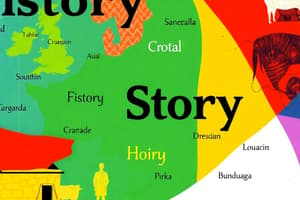Podcast
Questions and Answers
Which term refers to an object made by a human being that is of cultural or historical interest?
Which term refers to an object made by a human being that is of cultural or historical interest?
- Artifact (correct)
- Tradition
- Civilization
- Primary Source
What term describes a society characterized by urban development and cultural achievements?
What term describes a society characterized by urban development and cultural achievements?
- Migration
- Civilization (correct)
- Economy
- Nomadic
Which term best defines the study of humans and their ancestors, focusing on cultural practices?
Which term best defines the study of humans and their ancestors, focusing on cultural practices?
- Geography
- Anthropology (correct)
- Archaeology
- Economy
What is a characteristic of a nomadic lifestyle?
What is a characteristic of a nomadic lifestyle?
Which term refers to the transmission of customs and beliefs from one generation to another?
Which term refers to the transmission of customs and beliefs from one generation to another?
What type of source is classified as original materials from the time period being studied?
What type of source is classified as original materials from the time period being studied?
Which term describes the arrangement of events in the order they occurred?
Which term describes the arrangement of events in the order they occurred?
Which term is best associated with the study of material remains of past human life?
Which term is best associated with the study of material remains of past human life?
Flashcards are hidden until you start studying
Study Notes
Key Vocabulary Terms for History Grade 8 Chapter 1
-
Artifact: An object made by a human being, typically an item of cultural or historical interest.
-
Civilization: A complex society characterized by urban development, social stratification, and cultural achievements.
-
Culture: The social behavior, norms, beliefs, and practices of a particular group of people.
-
Economy: The system of production, distribution, and consumption of goods and services in a society.
-
Geography: The study of places, the relationships between people and their environments, and the spatial organization of human activities.
-
Historic Period: A segment of time in history recognized for particular events, developments, or characteristics.
-
Migration: The movement of people from one place to another, often to settle in a new location.
-
Nomadic: A lifestyle characterized by moving from one place to another rather than settling permanently.
-
Society: A group of individuals living together in a more or less ordered community.
-
Tradition: The transmission of customs, beliefs, and practices from one generation to another.
-
Technology: The application of scientific knowledge for practical purposes, especially in industry.
-
Anthropology: The study of humans, their ancestors, and related primates, focusing on cultural and social practices.
-
Archaeology: The scientific study of material remains of past human life and activities.
-
Primary Source: Original materials from the time period being studied, such as documents, artifacts, or recordings.
-
Secondary Source: Works that interpret or analyze primary sources; created after the fact.
-
Chronology: The arrangement of events in the order of their occurrence.
-
Settlement: A community or group of dwellings where people establish residence.
-
Nomads: People who move from place to place in search of food, water, and pasture.
Review these terms to understand the foundational concepts and vocabulary that will be used throughout the study of history in Grade 8.
Key Vocabulary Terms for History Grade 8 Chapter 1
- Artifact: Objects crafted by humans, reflecting cultural or historical significance.
- Civilization: Advanced societies marked by urban development, social hierarchy, and cultural innovations.
- Culture: Encompasses the customs, beliefs, and social practices unique to specific groups.
- Economy: Structure governing production, distribution, and consumption of goods and services within a society.
- Geography: Investigates location, human-environment interactions, and spatial arrangement of activities.
- Historic Period: Time frames recognized for distinctive events, developments, and historical significance.
- Migration: Population movements often driven by the desire to settle in new areas.
- Nomadic: Characterizes communities that do not maintain permanent residence and frequently relocate.
- Society: A community of individuals with organized interactions and structured relationships.
- Tradition: The continual passing down of customs and beliefs across generations.
- Technology: Use of scientific knowledge in practical contexts, significantly impacting industrial advancements.
- Anthropology: Discipline focused on human beings, their ancestry, and cultural practices.
- Archaeology: Scientific exploration of historical material remains and past human activities.
- Primary Source: Authentic materials originating from the era under examination, including records and artifacts.
- Secondary Source: Interpretative works analyzing primary sources, created post-event.
- Chronology: Systematic organization of events according to their occurrence in time.
- Settlement: Established communities where groups of individuals reside collectively.
- Nomads: Individuals transitioning continuously in search of resources such as food and water.
Studying That Suits You
Use AI to generate personalized quizzes and flashcards to suit your learning preferences.




